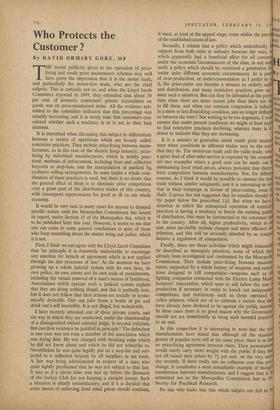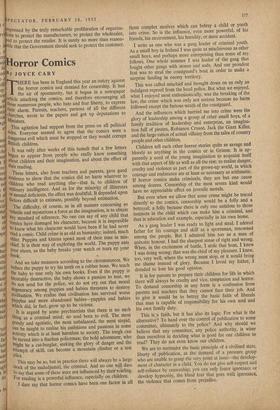Who Protects the Customer ?
By DAVID ORMSBY GORE, MP HE recent publicity given to the operation of price- fixing and resale price maintenance schemes may well have given the impression that it is the motor trade, and particularly the motor-tyre trade, who are the chief culprits. This is certainly not so, and when the Lloyd Jacob Committee reported in 1949, they estimated that about 30 per cent. of domestic consumers' private expenditure on goods was on price-maintained items. All the evidence sub- mitted to the committee indicated that this percentage was steadily increasing, and it is surely time that customers con- sidered whether such a tendency is or is not in their best interests.
It is important when discussing this subject to differentiate between a variety of operations which are loosely called restrictive practices. They include price-fixing between manu- facturers, as in the case of the electric lamp industry; price- fixing by individual manufacturers, which is widely prac- tised; methods of enforcement, including fines and collective boycotts or stop-lists, and the manipulation of markets by, exclusive selling arrangements. In some trades a whole com- bination of these practices is used, but there is no doubt that the general effect of them is to eliminate price competition over a great part of the distributive trades of this country, with consequent repercussions for good or ill on our whole economy.
It would be very rash in many cases for anyone to demand specific action until the Monopolies Commission has issued its report, under Section 15 of the Monopolies Act, which is to be published later this year. However, it seems to me that one can come to some general conclusions in spite, of those who keep mumbling about the matter being sub judice, which it is not.
First, I ihink we can agree with the Lloyd Jacob Committee that 'on principle it is extremely undesirable to encourage any sanction for breach of agreement which is not applied through the due processes of law.' At the moment we have growing up a whole judicial system with its own laws, its own police, its own courts and its own scale of punishments, including the virtual removal of a man's means of livelihood. Associations which operate such a judicial system explain that they are doing nothing illegal, and this is perfectly true; but it does not follow that their actions are socially or econo- mically desirable. One can take home a bottle of gin and drink one's self insensible. It is not illegal, but undesirable. it must, at least at the appeal stage, come within the purve eons of the established courts of law.
Secondly, I submit that a policy which undoubtedly I ble support from both sides in industry between the wars, under the economic circumstances of the time, is not ne which apparently had a beneficial effect for all concert sarily a policy which should be continued a generation Ial under quite different economic circumstances. In a pert of over-production, or under-consumption as I prefer to it, the price-cutter can become a menace to orderly sal and distribution, and many restrictive practices grew up meet such a situation. But can they be defended at the pres time when there are more vacant jobs than there arc ni to fill them, and when our constant companion is infiatt in a more or less flourishing condition, and no longer defiati as between the wars? Not wishing to be too dogmatic, I wo answer that under present conditions we might at least ex to find restrictive practices declining, whereas there is e dence to indicate that they are increasing. , .
It is a mistake to generalise about resale price maint ance when conditions in different trades vary to the ext that they do. The motor-car trade and the radio trade, whe a great deal of after-sales service is expected by the custom are two examples where a good case can be made out f maintaining fixed retail prices, always provided that there keen competition between manufacturers. Nor, for differ reasons, do I think it would be possible to operate the b trade without similar safeguards, and it is interesting to no that in their campaign in favour of price-cutting, even t Daily Express has not suggested that its retailers should the paper below the prescribed lid. But when we have situation in which the widespread operation of restricb$ practices is having a tendency to freeze the existing pats of distribution, that must be detrimental to the consumer a to the country. After all, higher productivity, which is 0 aim, must inevitably include cheaper and more efficient di. tribution, and this will be seriously retarded by so comp pensive a regulation of competition. rvi Mpressed by the truly remarkable proliferation of organisa- Ions to protect the manufacturers, to protect the wholesaler, nd to protect the retailer. It is surely no more than reason- ble that the Government should seek to protect the customer.











































 Previous page
Previous page